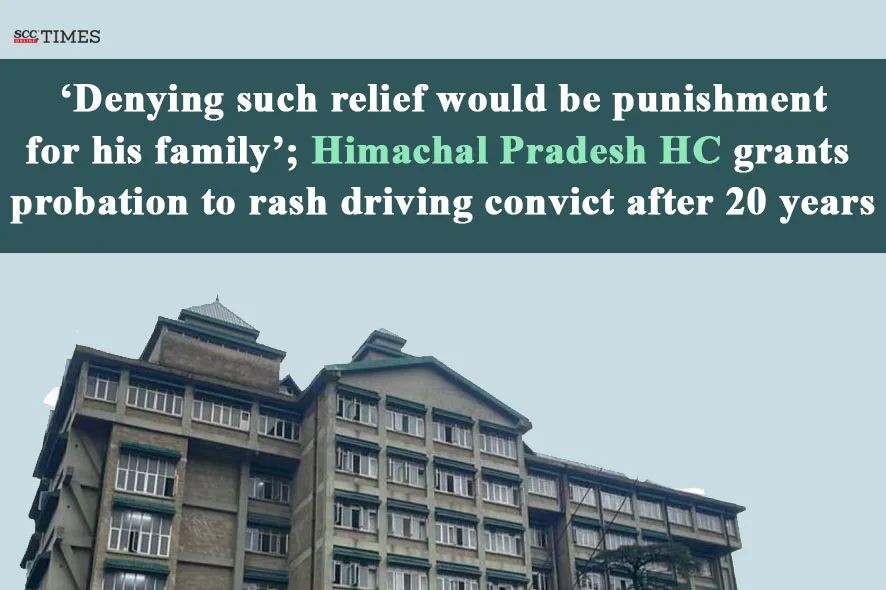Himachal Pradesh High Court: The present criminal revision was filed against the judgment dated 05-06-2013, passed by the Sessions Judge, Mandi (‘Appellate Court’), wherein the convict’s appeal against his conviction for rash and negligent driving dated 19-03-2009, was dismissed. The convict later stated that he did not want to continue with the revision and prayed for his release on probation. A Single Judge Bench of Virender Singh, J., while partly allowing the revision, modified the sentence and released the convict after 20 years of trial, on probation of good conduct for two years, holding that denying the relief would be a punishment for his family.
Background:
The accused was sentenced for offences punishable under Sections 279, 337, 338 and 201 of the Penal Code, 1860 (‘IPC’) for rash and negligent driving and injuring two persons, by judgment of conviction dated 19-03-2009 and order of sentence dated 23-03-2009. The convict appealed against his conviction which was dismissed by the Appellate Court on 05-06-2013, and the instant criminal revision was admitted by the High Court for hearing on 24-07-2013.
The convict appeared and stated that he did not want to press the instant criminal revision and prayed for his release on probation. His counsel urged that releasing him on probation would avoid punishing his family for his offence, as he was the first offender and the sole bread earner of his family.
Analysis and Decision:
The Court noted that the Trial Court had not considered his plea for release on probation. The Court relied on Dalbir Singh v. State of Haryana, (2000) 5 SCC 82, wherein the Supreme Court held that “bearing in mind the galloping trend in road accidents in India and the devastating consequences visiting the victims and their families, Criminal Courts cannot treat the nature of the offence under Section 304-A IPC as attracting the benevolent provisions of Section 4 of the Probation of Offenders Act, 1958 (‘POA’)”. The Supreme Court had emphasized that the power of the Courts to extend the benefit of probation depended upon the nature of the offence committed.
The Court referred to State v. Sanjiv Bhalla, (2015) 13 SCC 444, wherein it was laid down that for a just sentence the Trial Judge must consider the POA and the relevant provisions in the Criminal Procedure Code, 1973, and if probation or victim compensation could not be granted, the Judge must record reasons. It was further held that awarding compensation is part of just sentencing, and the Judge should remain open to alternative methods of mutually satisfactory dispositions.
The Court further referred to Paul George v. State of NCT of Delhi, (2008) 4 SCC 185, Nand Kishore v. State of H.P., 2016 SCC OnLine HP 3659, wherein the persons who were convicted for the offences punishable under Sections 279 and 337 IPC, were released on probation.
The Court noted that the Probation Officer’s report specifically mentioned the convict’s conduct in the society and disclosed that three FIRs were earlier registered against him, one resulting in acquittal, one compounded, and one reported as pending adjudication but shown to have been compromised by documents placed on record. The Probation Officer recommended extending the benefit of probation to the accused. The Court further noted that the offences for which the convict was convicted, were not punishable with death or imprisonment for life, and he had a permanent abode in District Mandi. The trial was already going on for the last 20 years, including the pendency of the appeal.
The Court opined that our criminal jurisprudence system is reformatory in nature, and sending the first offender to jail to undergo substantive sentences does not produce good results, as he may come in contact with the hardened criminals. The Court further opined that probation is a kind of non-custodial sentence which gives the convict an opportunity to reform himself while abiding certain conditions imposed by the Court.
Consequently, the Court, while partly allowing the revision petition, modified the order of sentence and observed that considering the nature of the offences, instead of directing him to undergo substantive sentence imposed by the Trial Court, it would be expedient to release the convict on probation of good conduct on his furnishing personal bond of Rs 30,000 with one surety for a period of two years, and to receive the substantive sentence when called upon to do so. The Court further ordered him to pay Rs 5000 as compensation to the victims of the accident.
[Ram Krishan v. State of H.P., 2025 SCC OnLine HP 5248, decided on 27-10-2025]
Advocates who appeared in this case:
For the Petitioner: Vijay Chaudhary, Advocate.
For the Respondents: Varun Chandel, Mohinder Zharaick and H.S. Rawat, Additional Advocates General, with Rohit Sharma, Deputy Advocate General.




